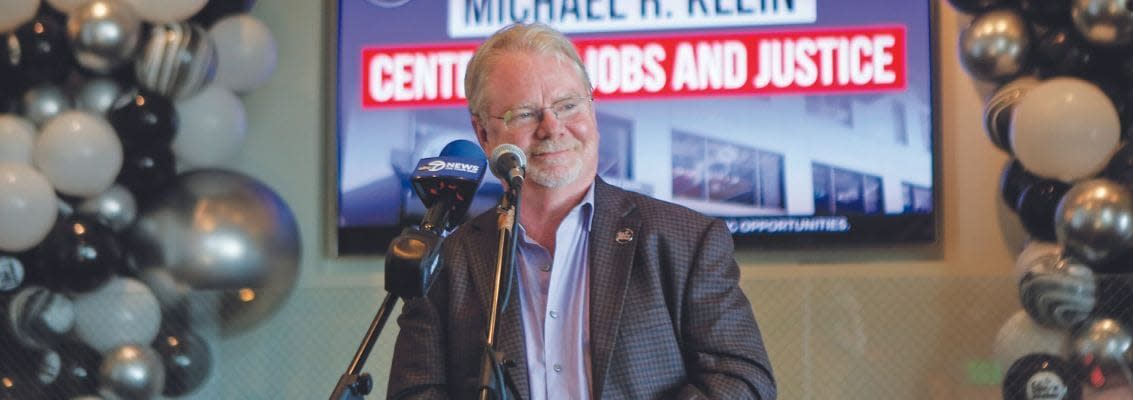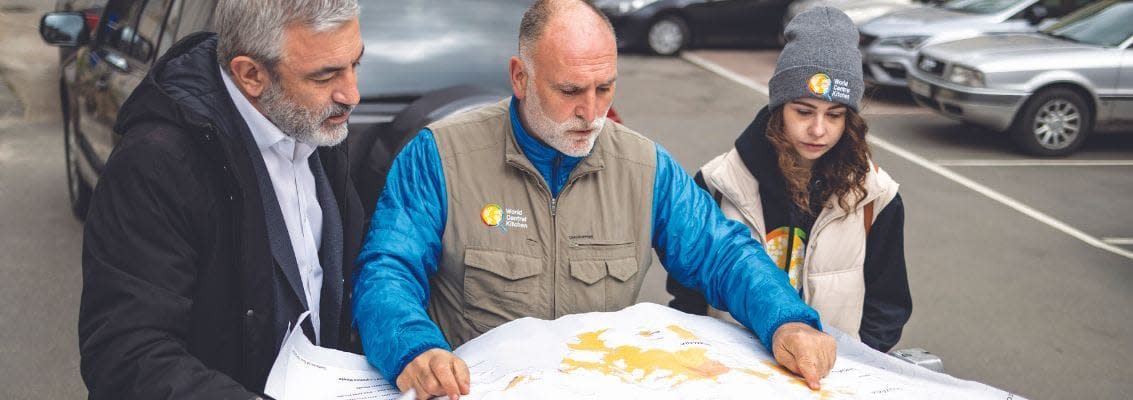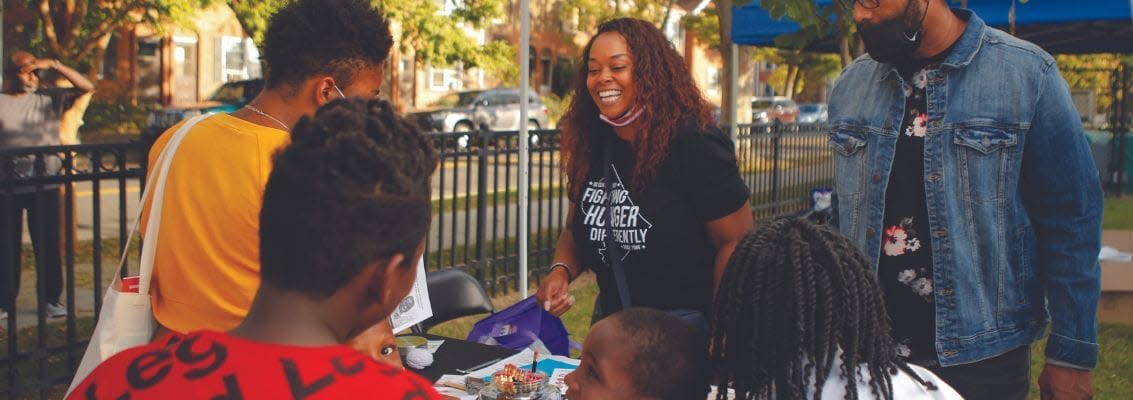Editor’s note: This article first published in the Fall 2022 issue of Beyond the Meeting Room, ALHI’s printed magazine, a luxury lifestyle publication focused on sharing compelling, inspirational and educational stories from beyond the four walls of a meeting room.
From war-torn Ukraine to storm-ravaged areas, the “Food Fighters” and chef relief teams of World Central Kitchen (WCK) have provided more than 120 million meals to people in crisis zones this year, most recently in hard-hit Southwest Florida.
The Washington, D.C.-based organization was founded in 2010 by globally renowned chef and humanitarian José Andrés and his wife, Patricia, to create “smart solutions” for combating hunger and poverty worldwide.
Hunger and food insecurity, rooted in poverty and exacerbated by COVID-19, are worsening around the world. That includes the U.S., where many are experiencing food and financial strain for the first time in two generations.
“Knowing the need in the world and in our own communities, cities and states can be overwhelming,” said Andrés. “We cannot lose empathy, though, without which nothing works.”
Andrés’ inspiration for WCK and its other food security and resiliency programs came from DC Central Kitchen (DCCK) and its founder, Robert Egger.
In the late 1980s, Egger, then a D.C. nightclub manager, and his fiancée, Claudia, volunteered to feed the homeless, along with their Georgetown church. Egger quickly recognized that handing out food would never break poverty and its underlying roots of oppression and social inequity. He also knew how much food was thrown away each day by D.C. hotels, restaurants and caterers.
Egger launched his pioneering “community kitchen” in 1989, offering food as the pathway to self-empowerment, self-sufficiency and upward mobility. He started by delivering recovered food to D.C. homeless shelters and creating DCCK’s flagship Culinary Job Training (CJT) program, which prepares at-risk adults and youth facing employment barriers for hospitality jobs.
In 1993, Andrés was a new arrival from his native Spain by way of New York City, and he began volunteering at DCCK. He said it was a life-changing experience.
“I clearly remember Robert, later my friend and mentor, telling me that, ‘Too often charity is about the redemption of the giver, when it should be about the liberation of the receiver,’” he recalled. “Hearing that and understanding how this little organization in the basement of a shelter was fighting hunger, stopping food waste and training people for success, changed my life and, in many ways, planted the seed for World Central Kitchen.”
In 2007, Egger focused on efforts to redefine the charity-oriented social agency sector and tapped his Chief Operations Officer, Mike Curtin, to take over as CEO.
“My path was to use the kitchen platform as a business-driven social enterprise to create sustainable economic development,” said Curtin, who has since expanded DCCK’s programming and is moving operations into a newly built headquarters and training kitchen in the Buzzard Point neighborhood in southwest D.C.
The Michael R. Klein Center for Jobs and Justice, named for DCCK Board Member and major supporter Michael R. Klein, is set to open this fall. Curtin, who has led the project for a decade, said the new facility is DCCK’s biggest step so far and symbolizes even broader possibilities.

A Spark Becomes a Flame
After graduating from Williams College in 1986, Curtin spent three-plus years teaching, copywriting and bartending in Osaka, Japan. When he returned to the U.S., he joined D.C.’s illustrious Hay-Adams, then an ALHI hotel, as marketing manager for Japanese corporate travelers. In 1998, while chairing the Restaurant Association of Metropolitan Washington (RAMW), he realized his ambition of owning his own restaurant, in Falls Church, Virginia. That dream soon became a nightmare as Curtin confronted grueling hours, P&L woes and, finally, closure.
“I can joke now about my first ‘nonprofit’,” said Curtin, “but my sense of failing investors, friends, family and myself sent me into a dark corner for a long spell.”
Reemerging as a hospitality consultant, Curtin first met Egger at a RAMW event.
“I found Robert and DCCK cool and different and got involved, including once sending them a truckload of unused food from a rained-out fundraiser,” he said. “Yet, it was only after learning about the COO opening that I saw myself joining the Kitchen. That lit a spark, and I saw my future clear as day.”
Empathy was a key deciding factor. “While I would never equate my story with our students’ often harrowing situations, my own experience gives me a deeply personal connection to our work,” Curtin said.
He is also deeply inspired by the teachings of Dr. Martin Luther King Jr. and other civil rights leaders.
“Providing meaningful employment with a living wage and benefits for marginalized individuals and returning them to dignity and self-sufficiency is the only way to break the poverty that underlies all other ills.”

Expanding the Reach
Recognized as a global social enterprise leader by Gerry Higgins, founder of the Edinburgh, Scotland-based Social Enterprise World Forum, DCCK has become even more impactful under Curtin’s leadership.
Employing 180 people, nearly half of them CJT graduates, DCCK creates more than $80 million in economic impact by keeping people off the streets and out of jail or shelters through empowered self-sufficiency.
To date, DCCK has converted more than 33 million pounds of locally grown farm products and discarded food that would have otherwise been wasted into 45 million meals. Placing nearly 90% of graduates over time, the approximately 14-week hands-on CJT course has helped more than 2,000 men and women launch careers at Marriott, Hilton, Kimpton and other area partners.
Through “relentless incrementalism,” Curtin has launched additional revenue-generating projects including the Healthy School Food program, which delivers more than 1 million locally sourced, scratched-cooked nutritious meals to D.C. schoolchildren each year. Healthy Corners delivers fresh produce and healthy snacks to corner stores in D.C.’s underserved neighborhoods.
Along the way, DCCK has inspired the formation of at least 100 similar organizations nationwide, WCK included.

Resilient Power
Like Curtin, Andrés is a man on a mission.
“The man is capable of anything…Keep up with him at your peril,” wrote the late Anthony Bourdain of Andrés when Time magazine named him one of “The World's 100 Most Influential People” in 2012. A decade later, Andrés, who garnered the honor again in 2018, is just as boundlessly active.
“The power of food is universal, and a universal human right,” said Andrés. “The power of our work becomes clearest to everyone in times of acute crisis. A plate of food is a plate of hope, and for the hungry and thirsty a matter of urgency now, not tomorrow.”
First activated in Haiti in 2010, WCK teams have since delivered some 220 million meals in natural and human-made crisis zones around the globe. Like DCCK, the mission is not about handouts, but jump-starting economic recovery by mobilizing local resources.
“No crisis is the same, so you must adapt, especially when building resilient food systems with locally led solutions,” Andrés continued. “In Ukraine, for example, we are now working with local producers to make and source oil, flour, sugar, pasta, grains, chicken and milk. Faster than bringing food from outside, this keeps money in the local economy.”
Meanwhile, the man of action is expanding his D.C.-based ThinkFoodGroup restaurant collection, including bringing his globe-spanning Bazaar to D.C.’s Old Post Office Pavilion, set for reflagging as a Waldorf Astoria, later this year.
After closing his Bazaar and Somni restaurants in Los Angeles in 2020, Andrés returned this summer with four F&B concepts at the new Frank Gehry-designed Conrad Los Angeles hotel including Spain-meets-California San Laurel and rooftop Latin-Asian concept Agua Viva. In July, his longtime D.C. favorite Turkish-Greek-Lebanese concept Zaytinya debuted at the new Ritz-Carlton New York, NoMad, where another Bazaar is slated for late 2022.
“As our restaurants grow and innovate, our team grows, too, providing jobs and community giveback,” said Andrés, who still always keeps DCCK top of mind.

Bringing the Kitchen Home
“José has championed us ever since he first volunteered in the Kitchen,” said Curtin. “As his fame, relief work and empire have grown, his attention conceivably could have waned, but it’s only increased. From supporting our annual fundraisers to using his platform to showcase our work, he remains a steadfast friend and partner.”
As co-chair of the “Bringing the Kitchen Home” campaign for the new Center for Jobs and Justice, Andrés has played an important role in securing $33 million of the project’s $35 million construction and other costs.
“After a decade of jumping through hoops to win the hearts and minds of developers and investors, our moment is here,” said Curtin. “The Center is a transformational entity that stands for all I want the Kitchen to be, starting with our values of transparency, community, diversity, equity, inclusion and opportunity.”
The state-of-the-art production kitchen stands to triple capacity and economic impact, targeting $200 million after the first two years. All spaces are purposefully designed for interaction and conversation, video-conferencing included, creating a place for community gatherings and board meetings, including welcoming outside groups.
Curtin’s plans call for educating and inspiring individuals and corporations by reimagining traditional team building and meeting programs. Instead of, say, a ropes course, groups can volunteer in the kitchen and then dine and converse with staff and graduates about how to apply the DCCK experience to their corporate culture. He even hinted at group cooking classes with Andrés and other D.C. chefs.
The most far-reaching impact, however, is poised to come from the pioneering development model behind the Center itself.

The End Game
“At 36,000 square feet, we anchor a 70,000-square-foot mixed-use investment that includes luxury apartment rentals and upscale restaurants and retail,” said Curtin. “That is unusual, if not unheard of, since our space would typically house a nationally recognized retailer. Our hope and vision is that our presence in this mix inspires other cities and locales to rethink what investing in sustainable economic development projects can look like, and how the long-term value we create is far more valuable than a short-term lease.”
He credits project partner Herbert Miller, the founder of D.C.’s Western Development, with “believing in the vision and staying the course,” Curtin’s ambitions are grounded in results.
“Our numbers prove definitively that folks who face systemic obstacles will choose a job that involves hard work but that pays fairly, with benefits, and offers long-term stability over welfare, the street, the shelter or prison,” he said. “We see the children of our graduates breaking free of the poverty cycle. We know our model works.”
There’s still more to do, said Curtin, pointing out that 36% of Washington, D.C.-area residents are food insecure, according to the Capital Area Food Bank’s 2022 Hunger Report.
“That’s criminal for our nation’s capital. Seventy-seven percent of those folks, mostly people of color, have jobs but cannot either afford or access enough food to stay healthy. And D.C. has among the highest rates of senior and childhood hunger in the nation.”
Curtin said world leaders must acknowledge the problem of poverty and hunger and invest in the kind of work done by DCCK and WCK.
“If that happens, we are out of business—which is our goal,” he said. Andrés, for one, is keeping the faith.
“Mike does an amazing job carrying on the work of the Kitchen, and together, we will continue to believe in the power of food to rebuild lives, communities and dignity.”